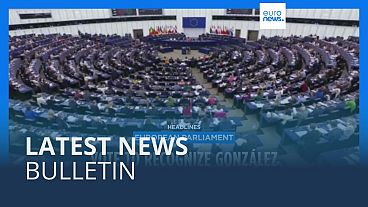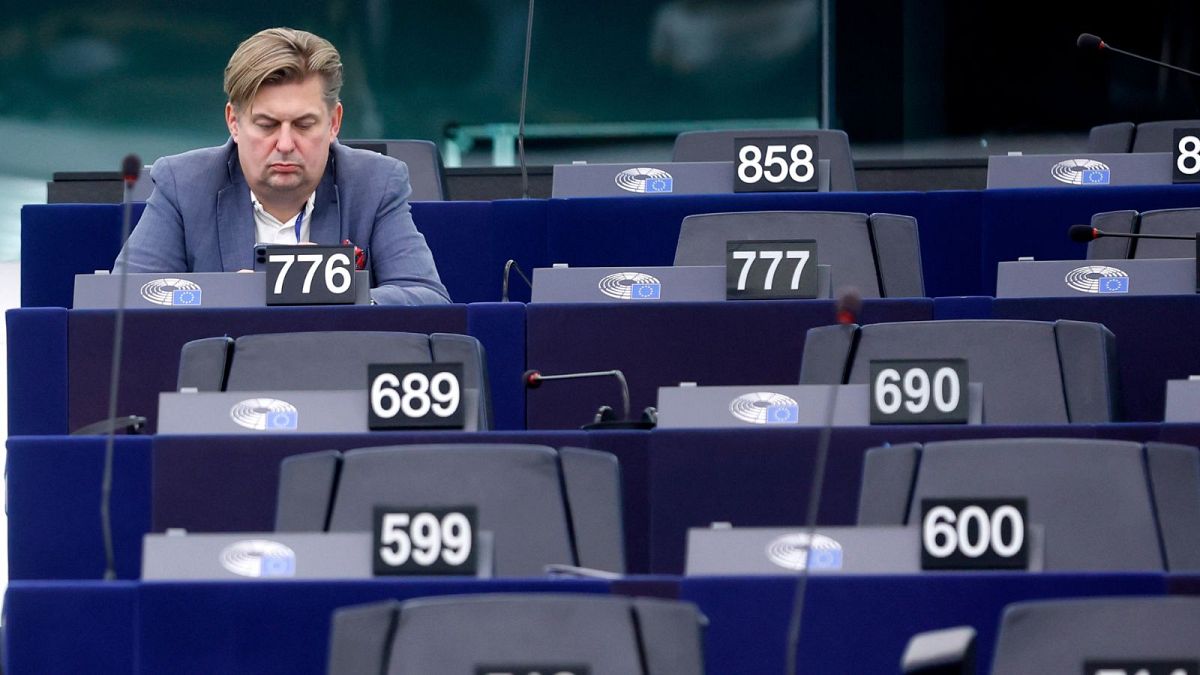Some broke it off, some got dumped, and some just prefer the single life. Euronews examines how the EU’s 32 unattached MEPs got that way.
There’s been a "back-to-school" atmosphere in Strasbourg, as MEPs head back to work after the summer break: but for some the return has been a solitary one.
There are 32 non-attached MEPs who don’t belong to any political group, and must take their seats at the back of the hemicycle — whether by choice or otherwise.
Being a lone wolf comes with its perks: independents can participate or vote without worrying about wider calculations, and they even get a dedicated secretariat for administrative support.
But freedom comes at a price: their amendments, speaking time and representation in the Parliament’s administrative structures are all limited, and so is visibility.
Euronews looks at the unattached MEPs in the current Parliament, and how they got that way.
Odd ones out
The European Parliament has its fair share of extreme political groups, where even communists and far-right nationalists find a home – but some MEPs are even more out-there.
Grzegorz Braun had a few run-ins with the Polish justice system during his time at the Warsaw Parliament.
He infamously used a fire extinguisher on candles celebrating the Jewish festival of Hanukkah, and removed a Christmas tree from a public building because it featured European flags and LGBTQI+ decorations.
He’s one of three non-attached MEPs from Poland’s Confederation Party.
Further south in Slovakia, MEP Milan Mazurek is also known for antisemitic outbursts, and has been convicted for anti-Roma statements.
Once aligned with the right-wing Identity and Democracy group, German MEP Maximilian Krah now sits alone, after he was reported making comments appearing to sympathise with the Nazi paramilitary SS unit.
Then there’s Romanian MEP Diana Șoșoacă , who certainly made a dramatic entrance at her first plenary session. While her colleague Valérie Hayer (France/Renew) voiced her support for abortion rights, Șoșoacă waved a portrait of the Virgin Mary, shouting, “In God we trust!” and “You’re killing people!”
“I wasn’t looking for a group, they were looking for me, and they put conditions on it ... they want to be politically correct,” she told Euronews, suggesting she’d rather be independent than tone down her strong views on issues like LGBTIQ rights.
Șoșoacă —who was previously sanctioned by Kyiv for requesting the annexation territories from southern Ukraine – is now running as candidate in the Romanian presidential elections of 24 November.
The class clowns
Who says the European Parliament has to be boring?
Certainly not Fidias, the 24-year-old YouTuber-turned-MEP with 2.6 million followers. He shares his activity from the hemicycle on X — from speeches, to explainers on how the Parliament works, to critical analyses of his MEP perks.
He even lets his followers weigh in, polling them to ask if he should vote to give Ursula von der Leyen a second term (no) or join a political group (also no).
“It seems the system isn’t really designed for independent politicians. Non-attached MEPs are often overlooked,” Minchón Rodicio explained.
Besides the influencers, the Parliament has literal comedians, including two MEPs from Germany’s satirical “Die Partei”: Sibylle Berg and Martin Sonneborn.
Sonneborn, the protest party’s founder, was first elected in 2014 promising to rebuild the Berlin Wall and cap the prices of beer and kebabs.
Too cool for school
Sometimes, MEPs break away after seeing the system from the inside: including many far-left parties who were unhappy with their group’s views on issues such as migration, climate change, or foreign policy.
In 2014, the Communist Party of Greece slammed the door on the leftist group it had sat in for 20 years; from Czechia, the Communist Party of Bohemia and Moravia made a similar move in July.
Meanwhile, some newcomers just don’t seem sold on what existing political parties have to offer.
Lukas Sieper, an MEP from Germany’s Party of Progress, advocates judging each law on its own merit, free from ideology or bias.
“Ideally, we would join a group in the European Parliament that shares this pragmatism. However, the current groups are all ideologically based,” he told Euronews.
It’s a sentiment echoed by Czechia’s Ondřej Dostál.
“Facing a choice between becoming non-attached or betraying the trust of my voters, I chose the former,” he told Euronews.
“I’m in a similar position to opposition members, like the Patriots, who are in the ‘cordon sanitaire’,” Dostál said, referring to the system under which far-right MEPs are locked out of key positions such as committee chairmanships. “I find this approach by the majority groups to be utterly undemocratic.”
The will-they, won’t-theys
In other cases, MEPs’ outsider status may only be temporary.
The arrival of Alvise Pérez, of Spain’s “The Party is Over”, made waves earlier this year, given his right-wing views, and anti-vaccine stance that shot him to prominence during Covid-19.
After negotiations with various groups, Alvise announced in July he’d joined the European Conservatives and Reformists group, but that’s not yet been made official – a delay which, one party source told Euronews, is due to concerns raised by Giorgia Meloni, the Italian Prime Minister who heads the group.
Negotiations are ongoing, with an announcement expected next week, the source said.
On the other side, dissidents from Germany’s left-wing Die Linke, along with the six MEPs from the Sahra Wagenknecht Alliance, are eyeing a coalition with Slovakia's SMER – which was previously ousted from the socialist grouping — alongside Czech communists, and independent Ondřej Dostál, to create a conservative-left group.
But they face an uphill battle: a parliamentary group requires at least 25 MEPs from seven different member states to be officially recognised.












